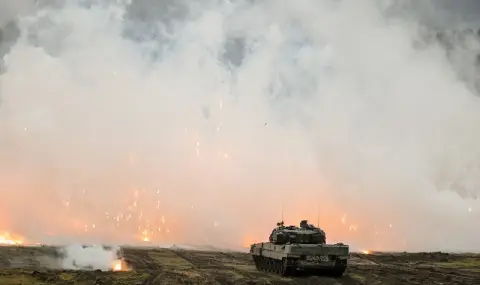The main political parties in Germany supports that Ukraine uses German weapons even on the territory of Russia. Will this mean direct German intervention in the war?
For the German Ministry of Defense, the answer to the question is simple: "These are Ukrainian weapons," said its spokesman Wolfgang Buchner. According to this interpretation, the German government no longer has anything to do with the weapons once they have been delivered to Ukraine. The offensive in the Kursk region was also "an operation that was prepared entirely in secret and without feedback", i.e. apparently without consultation, Buchner also said.
The speaker emphasized that for the German government, it is only important that Kiev respects international law, which the authorities in the Ukrainian capital have assured Berlin. "There are no additional requirements for the use of weapons," and Ukraine is "free to decide." The German government has not yet confirmed whether German weapons are actually being used in the Ukrainian offensive in Russia. As for military equipment, for example, the Leopard tanks could be used. 1 and 2 or the "Marder" combat vehicle, as well as rocket launchers.
Russian media have published images they claim show Ukrainians using the "Marder" in the battles in the Kursk region. Even if the photos are authentic, "Germany is clearly not legally involved in this military operation of the Ukrainian armed forces on Russian territory," Rafael Los from the European Council for Foreign Policy (ECFP) told DV. As long as Ukraine complies with humanitarian legal requirements, it has the right to conduct such military operations. These requirements include the prohibition of attacking civilian targets, as well as the fair treatment of prisoners of war. So far, Ukraine has been very responsible about this - in complete contrast to Russia.
Among the German parties there is a consensus on the subject
Politicians from different parties - from the government and from the opposition - also made it clear that such an operation would not be a problem from a legal point of view: "Of course, a country that is attacked has the right to defend itself. This also means that according to international law he can, as long as he complies with all the rules, take action on Russian territory," said Lars Klingbeil, the leader of the ruling German Social Democratic Party in an interview with ARD.
The expression of such an opinion by a party that has been described more than once as the "party of peace" is new. The other coalition partners in the German government have long defended this thesis. Greens MP Sarah Nani, for example, defended the use of German weapons in Russia even before the Kursk offensive.
Roderich Kieseweter, a security politician from the largest opposition party - CDU, wrote for DV at the beginning of the year: "Ukraine's attacks against military targets on Russian territory are not only permissible according to international law, but also necessary from the point of view point of military strategy and makes perfect sense." This does not make Germany an active participant in the war, he also believes.
Ukraine is not obliged to attack only on its territory
Politicians most often refer to Article 51 of the UN Charter, which guarantees the "inalienable right of individual or collective self-defense in the event of an armed attack against a member of the Organization".
Wolf Heinchel von Heineg, an expert in international law, confirms that in international armed conflicts "no party to the conflict is obliged to stick to military action only on its own territory". In his words, the situation is just the opposite - "this is a legitimate way to weaken the enemy's armed forces and thus attack military targets," the expert adds. ECHR expert Rafael Los also believes that "there are no provisions of international law that prohibit the attacked party from attacking the aggressor on its own territory."
Scholz did not comment
German Chancellor Olaf Scholz hesitated for a long time before sending Ukraine some long-range weapons. The decision to provide, for example, tanks was made after long domestic political discussions and international pressure.
The reason for the hesitation was the fear that this could lead to an escalation of the war and even involve Germany in it. To this day, Scholz refuses to provide Ukraine with "Taurus" missiles. Long-range missiles can be directed from the territory of Ukraine even to Moscow. So far, the German chancellor has not commented on the use of German weapons in the Ukrainian offensive in the Kursk region.
In July, a poll showed that 36% of Germans believed that arms supplies to Ukraine had crossed some line. In East Germany, this percentage is even higher - one out of every two respondents. If it is confirmed that Ukraine is using German weapons in Russia, the mood in part of the German population may turn even more against military support.
